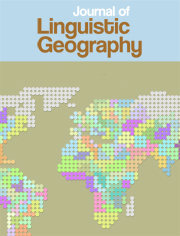Article contents
The Plautdietsch Vowel Shift Across Space and Time
Published online by Cambridge University Press: 22 August 2016
Abstract
This paper provides an account of the long vowel shift currently underway in the trans-statal Plautdietsch speech community. Placement of the shift within Labov’s typology of vowel shifts reveals a commonly overlooked development in Plautdietsch vowel movement, namely the centralization of mid-high back vowels which must have occurred before the breakup of the community into New and Old World groups. Shared centralization prompted both groups to have similar developments in the back vowel space after they were no longer geographically contiguous and prompted many groups to undergo centralization in the front vowel space. This case study reveals a pattern of innovation in which separation from parent communities fosters linguistic innovations in daughter communities. These innovations occur irrespective of the traditional Molotschna or Chortitza dialect affiliation of the daughter colonies in question.
Keywords
Information
- Type
- Articles
- Information
- Copyright
- Copyright © Cambridge University Press 2016
References
- 1
- Cited by

